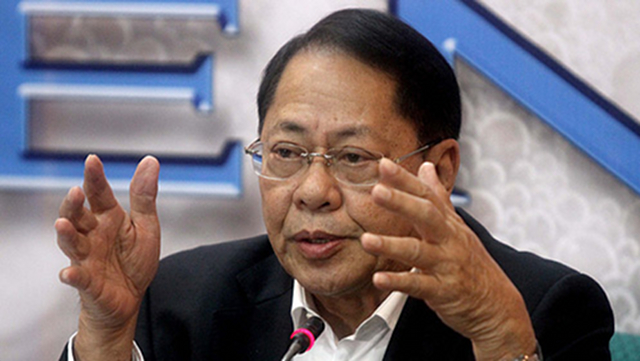SUMMARY
This is AI generated summarization, which may have errors. For context, always refer to the full article.

MANILA, Philippines – Those who merely “like” or share libelous posts on social media need not worry.
For Sen Edgardo Angara, they will not be automatically punished under the controversial Cybercrime Prevention Act of 2012. Angara is the sponsor of the law in the Senate and one of its authors.
During the Kapihan sa Senado press forum on Thursday, October 4, Angara sought to allay fears about the law that took effect Wednesday.
Angara addressed concerns that merely “liking,” sharing, retweeting or reposting libelous comments online may hold Internet users liable under the law.
“That’s so hard to prove. You have nothing to fear,” Angara said. “The anxiety and apprehension over this are exaggerated.”
The senator said for an Internet user to be held liable, it must first be proven that there was a conspiracy between the source of the libelous post and those who shared it. Accusers must prove that the post was meant to destroy a person’s name.
Critics of the law have said the matter of reposting or sharing is one of the gray areas in the law. Sen Teofisto “TG” Guingona III, the lone senator who opposed the bill, pointed this out in a Thought Leaders piece for Rappler.
“Without a clear definition of the crime of libel and the persons liable, virtually any person can now be charged with a crime …. The obvious result would be widespread and immediate gag on computer users faced with a law that has no limitations against liability. Surely, this is not a vision of a free and democratic environment,” Guingona said.
In response, Angara said libel is only committed when there is proof that “utterly false and malicious statements” were made.
Angara made the statement a day after he announced that he will file an amendatory bill to his own law. The senator said he wants to lower penalties for cybercrimes, and repeal the so-called takedown clause.
It is unclear how his assurance will figure into the implementation of the law because authorities have yet to craft the implementing rules and regulations. The Supreme Court also has to decide on its constitutionality, with 10 pending petitions questioning the constitutionality of the law.
‘Freedom of speech not absolute’
In the press conference, Angara reiterated that it is necessary to penalize online libel despite criticism from journalists, bloggers and netizens.
If advocates and some lawmakers really wish to decriminalize libel, Angara said it is not enough to oppose the cybercrime law.
“The solution is: repeal the basic law of libel in the Revised Penal Code.”
He added, “The idea is that freedom of speech or of the press does not protect libelous or slanderous statements. One can review the whole history of freedom of speech and [of] the press, and libel is not protected by freedom of speech.” – Rappler.com
Add a comment
How does this make you feel?
There are no comments yet. Add your comment to start the conversation.